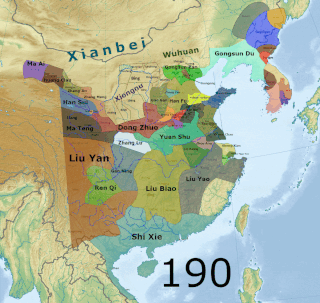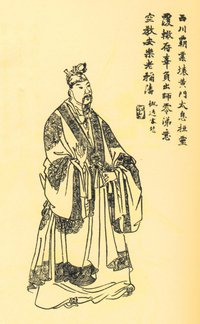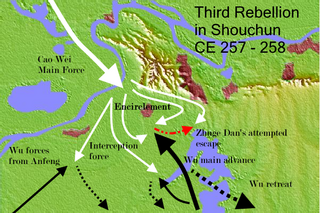Related Research Articles

The Three Kingdoms of Cao Wei, Shu Han, and Eastern Wu dominated China from 220 to 280 AD following the end of the Han dynasty. This period was preceded by the Eastern Han dynasty and followed by the Western Jin dynasty. Academically, the periodisation begins with the establishment of Cao Wei in 220 and ends with the conquest of Wu by Jin in 280. The period immediately preceding the Three Kingdoms from 184 to 220 was marked by chaotic infighting among warlords across China as Han authority collapsed. The period from 220 to 263 was marked by a comparatively stable arrangement between Cao Wei, Shu Han, and Eastern Wu. This stability broke down with the conquest of Shu by Wei in 263, followed by the usurpation of Cao Wei by Jin in 266, and ultimately the conquest of Wu by Jin in 280.

Jiang Wei, courtesy name Boyue, was a Chinese military general and politician of the state of Shu Han during the Three Kingdoms period of China. Born in Ji County, Jiang Wei started his career as a military officer in his native Tianshui Commandery, which was a territory of Wei. In 228, when Wei's rival state Shu launched an invasion led by Zhuge Liang, Jiang Wei was distrusted by Ma Zun, then administrator of Tianshui Commandery. As such, Jiang Wei had to defect to Shu. Zhuge Liang, the Imperial Chancellor and regent of Shu, highly regarded Jiang Wei and appointed him as a general in Shu. After Zhuge Liang's death in 234, Jiang Wei continued serving as a military commander during the regencies Jiang Wan and Fei Yi, eventually rising to the highest military rank of General-In-Chief (大將軍) after Fei Yi's death in 253. Between 240 and 262, he continued Zhuge Liang's legacy of waging war against Wei by leading another 11 military campaigns. However, Jiang Wei's campaigns were relatively constrained in terms of both scale and duration due to Shu's limited resources and inadequate food supplies, as well as internal political faultlines. In 263, when Wei launched a massive invasion of Shu, Jiang Wei led Shu forces to resist the invaders at Tazhong, Yinping and Jiange, himself defending Jiange which was under Zhong Hui's attack. While Jiang Wei managed to temporarily stall Wei's main force led by Zhong Hui, Deng Ai, another military commander of Wei, took a shortcut via Yinping and showed up at Chengdu unexpectedly. Liu Shan surrendered to Deng Ai without putting up resistance and ordered Jiang Wei to surrender to the Wei general Zhong Hui; this event marked the end of Shu's existence. In the following year, Jiang Wei instigated Zhong Hui to launch a rebellion in Chengdu against the Wei regent Sima Zhao and hoped to use the opportunity to gain military power and restore Shu. However, some of Zhong Hui's officers were unwilling to participate in the rebellion and started a mutiny, killing Jiang Wei and Zhong Hui.

Han (漢; 221–263), known in historiography as Shu Han (蜀漢 ) or Ji Han (季漢 "Junior Han"), or often shortened to Shu (Chinese: 蜀; pinyin: Shǔ; Sichuanese Pinyin: Su2 < Middle Chinese: *źjowk < Eastern Han Chinese: *dźok), was a dynastic state of China and one of the three major states that competed for supremacy over China in the Three Kingdoms period. The state was based in the area around present-day Hanzhong, Sichuan, Chongqing, Yunnan, Guizhou, and north Guangxi, an area historically referred to as "Shu" based on the name of the past ancient kingdom of Shu, which also occupied this approximate geographical area. Its core territory also coincided with Liu Bang's Kingdom of Han, the precursor of the Han dynasty.

Liu Shan, courtesy name Gongsi, was the second and last emperor of the state of Shu Han during the Three Kingdoms period. As he ascended the throne at the age of 16, Liu Shan was entrusted to the care of the Chancellor Zhuge Liang and Imperial Secretariat Li Yan. His reign of 40 years was the longest of all emperors in the Three Kingdoms era. During Liu Shan's reign, many campaigns were led against the rival state of Cao Wei, primarily by Zhuge Liang and his successor Jiang Wei, but to little avail, due to their drastic mismatch in terms of population and geographic extent. Liu Shan eventually surrendered to Wei in 263 after Deng Ai led a surprise attack on the Shu capital Chengdu. He was quickly relocated to the Wei capital at Luoyang, and enfeoffed as "Duke Anle". There he enjoyed his last years peacefully before dying in 271, most probably of natural causes.

Deng Ai, courtesy name Shizai, was a Chinese military general and politician of the state of Wei during the Three Kingdoms period of China. He is best known for his pivotal role in the Wei conquest of its rival state, Shu, in 263. He was described as a very loyal subject who made great contributions to Wei, but was also noted for his arrogance and audacity, which led to his downfall and death.

Sima Zhao, courtesy name Zishang (子上), was a Chinese military general, politician, and regent of the state of Cao Wei during the Three Kingdoms period of China.

Zhuge Liang's Northern Expeditions were a series of five military campaigns launched by the state of Shu Han against the rival state of Cao Wei from 228 to 234 during the Three Kingdoms period in China. All five expeditions were led by Zhuge Liang, the Imperial Chancellor and regent of Shu. Although they proved unsuccessful and ended up as a stalemate, the expeditions have become some of the best known conflicts of the Three Kingdoms period and one of the few battles during it where each side fought against each other with hundreds of thousands of troops, as opposed to other battles where one side had a huge numerical advantage.

Zhong Hui, courtesy name Shiji, was a Chinese calligrapher, essayist, military general, and politician of the state of Cao Wei during the Three Kingdoms period of China. He was the younger son of Zhang Changpu with Zhong Yao, who served as the Grand Tutor in the Wei imperial court. He was already known for being insightful, intelligent and knowledgeable since he was young. Zhong Hui rose to prominence in the 250s when he became a close aide to Sima Zhao, the regent and de facto ruler of Wei. He advised Sima Zhao on how to deal with the Third Rebellion in Shouchun from 257 to 258 and was highly regarded by the latter. With Sima Zhao's help, Zhong Hui steadily moved up the ranks and became one of the key figures in the Wei government.
Cao Shuang, courtesy name Zhaobo, was a Chinese military general and regent of the state of Cao Wei during the Three Kingdoms period of China. He was the eldest son of Cao Zhen, a prominent general of Cao Wei. He initially held great power in Cao Wei as General-in-Chief but later lost his power to Sima Yi in the Incident at Gaoping Tombs and was executed on charges of treason.
Guo Huai, courtesy name Boji, was a Chinese military general of the state of Cao Wei during the Three Kingdoms period of China. He started his career towards the end of the Eastern Han dynasty under the warlord Cao Cao as a subordinate of Cao Cao's generals Xiahou Yuan and Zhang He. During the Three Kingdoms period, he served in Wei, the state established by Cao Cao's son Cao Pi, and lived through the reigns of four Wei emperors. From the 220s until his death in 255, he governed and defended Wei's western borders in Yong and Liang provinces. During this time, he resisted multiple invasions by Wei's rival state, Shu Han, and quelled some rebellions by local Qiang, Di and other non-Han Chinese tribes.
Chen Tai, courtesy name Xuanbo, was a military general and official of the state of Cao Wei during the Three Kingdoms period of China. He was a son of Chen Qun and a maternal grandson of Xun Yu. Chen Tai was very knowledgeable in the art of war, and so led his men as if they were his own children. When the regent Sima Shi began abusing his power and the emperor Cao Mao died under very suspicious circumstances, Chen Tai expressed his deep loyalty to the Cao Wei state by donning mourning garments at Cao Mao's funeral.

Romance of the Three Kingdoms is a Chinese television series adapted from the classical 14th century novel of the same title by Luo Guanzhong. The series was produced by China Central Television (CCTV) and was first aired on the network in 1994. It spanned a total of 84 episodes, each approximately 45 minutes long. One of the most expensive television series produced at the time, the project cost 170 million yuan. It was completed over four years and involved over 400,000 cast and crew members, including divisions of the People's Liberation Army from the Beijing, Nanjing and Chengdu military regions. Some of the dialogue spoken by characters was adapted directly from the novel. Extensive battle scenes, such as the battles of Guandu, Red Cliffs and Xiaoting, were also live-acted.

Zhang Yi, courtesy name Bogong, was a Chinese military general and politician of the state of Shu Han during the Three Kingdoms period of China. Born in the late Eastern Han dynasty, Zhang Yi was a 10th-generation descendant of Zhang Liang. He started his career as a scribe under the warlord Liu Bei, who founded Shu later, and gradually rose to the positions of a county prefect and commandery administrator. In the early 230s, he served as an area commander tasked with maintaining the peace in Shu's southern commanderies. In 234, he led the Shu vanguard during the Battle of Wuzhang Plains against Shu's rival state Wei. From 238 to 259, Zhang Yi steadily rose through the ranks to become one of Shu's top generals. During this time, although he strongly opposed the Shu general Jiang Wei's aggressive stance towards Wei, he still accompanied Jiang Wei on his military campaigns against Wei. In 263, he surrendered to Wei forces along with the Shu emperor Liu Shan when Wei launched a large-scale invasion of Shu. In the following year, Zhang Yi was killed by mutineers during a rebellion by the Wei general Zhong Hui. Like Liao Hua and Zong Yu, Zhang was one of few officials who served the Shu-Han state throughout its entire existence.
Jiang Wei's Northern Expeditions refer to a series of eleven military campaigns launched by the state of Shu Han against its rival state, Cao Wei, between 240 and 262 CE during the Three Kingdoms period in China. The campaigns were led by Jiang Wei, a prominent Shu general. Unlike the previous Northern campaigns led by Zhuge Liang, which added Wudu and Yinping commanderies to Shu Han state territories, Jiang Wei's campaigns ended up being unpopular in both the military and civil circles in Shu. Also unlike Zhuge Liang's campaigns which often featured 60,000 to sometimes even 100,000 Shu Troops, Jiang Wei's were often much smaller rarely exceeding 30,000 even after the death of Fei Yi, where Jiang Wei assumed control of the military. The Zhuge Liang campaigns did suffer from logistical and supply issues for their large army. Zhuge's successor Jiang Wan, believed that it was the Hanzhong's mountainous terrain itself that were to blame for the campaigns failures and attempted to switch the route through the Han river. Fei Yi, who succeeded Jiang Wan, agreed, and never allowed any large campaigns to be launched by Hanzhong. Jiang Wei however overlooked these concerns and used Hanzhong as his home base as Zhuge Liang did.

The Conquest of Shu by Wei was a military campaign launched by the dynastic state of Cao Wei against its rival Shu Han in late 263 during the Three Kingdoms period of China. The campaign culminated in the fall of Shu Han and the tripartite equilibrium maintained in China for over 40 years since the end of the Eastern Han dynasty in 220. The conquest laid the foundation for an eventual reunified China under the Western Jin dynasty in 280.
The Three Rebellions in Shouchun were a series of revolts that occurred in the state of Cao Wei during the Three Kingdoms period. The rebellions broke out in the later years of Wei when the Sima clan, headed by Sima Yi, usurped state power. The military governors of Shouchun rose in revolt thrice in the name of a rebellion to oust the Sima clan from power. The respective leaders of the three rebellions were Wang Ling, Guanqiu Jian and Wen Qin, and Zhuge Dan. All the revolts were eventually suppressed.

Zhuge Dan's Rebellion, or the Third Rebellion in Shouchun, was a revolt led by Zhuge Dan, a general from the state of Cao Wei, against the regent Sima Zhao. Zhuge Dan received some support from Eastern Wu, Cao Wei's rival state. It was the third and final of a series of three rebellions that took place in Shouchun in the 250s during the Three Kingdoms period of China.

Wang Jing, courtesy name Yanwei, was a Chinese politician of the state of Cao Wei during the Three Kingdoms period of China.

The Advisors Alliance is a 2017 Chinese two-part television series based on the life of Sima Yi, a government official and military general who lived in the late Eastern Han dynasty and Three Kingdoms period of China. The series starred Wu Xiubo as the main character, with Liu Tao, Li Chen, Janine Chang, Tang Yixin, Yu Hewei and Wang Luoyong playing supporting roles. The first part of the series started airing on Jiangsu TV and Anhui TV on 22 June 2017. The second part started airing on Youku on 8 December 2017.
References
- ↑ (八月,維將數萬人至枹罕,趨狄道。 ... 九月,甲辰,維遁走,城中將士乃得出。)Zizhi Tongjian vol. 76.
- Selected Examples of Battles in Ancient China Writing Team, Selected Examples of Battles in Ancient China, 1st Edition, published by Chinese Publishing House & Distributed by New China Bookstore Publishing House in Beijing, 1981 - 1984.
- Yuan, Tingdong, War in Ancient China, 1st Edition, published by Sichuan Academy of Social Science Publishing House & Distributed by New China Bookstore in Chengdu, 1988, ISBN 7-80524-058-2.
- Zhang, Xiaosheng, General View of War of Ancient China, 1st Edition in Xi'an, published by Long March Publishing House in Beijing & Distributed by New China Bookstore in Beijing, 1988, ISBN 7-80015-031-3 (set).